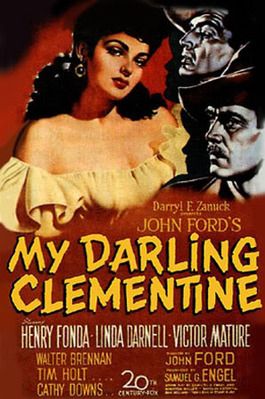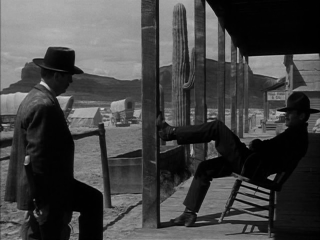
My Darling Clementine
1946
Director: John Ford
Starring: Henry Fonda, Walter Brennan, Victor Mature, Linda Darnell
One of my all-time favorite westerns, My Darling Clementine manages to have all the classic hallmarks of its genres, but the overall mood and feeling seems fresher, lighter. It is the oft-told tale of Wyatt Earp and Doc Holliday fighting the Clantons at the O.K. Corral – American Western mythology at its finest – but the story has never been told quite like this.
When Wyatt Earp (Fonda) and his brothers stop in Tombstone for the night, the lawless Clanton clan kills the youngest brother to steal the herd of cattle the Earps were pushing to California. Instead of moving on, Wyatt decides to stay on in Tombstone as marshal in order to avenge the death of his brother, falling in love with a pretty lady and butting heads with the gloriously curmudgeonly Doc Holliday (Mature) along the way.
When you boil the plot down like this, My Darling Clementine sounds like a bitter tale of gritty revenge. Oddly enough, it’s the furthest from it, and that’s thanks to Fonda’s performance as Wyatt Earp and John Ford’s brisk direction. Consider: in his first night in Tombstone, Earp goes to the barber for a shave (falling backwards off the fancy new barber’s seat in the process), during which bullets fly in through the window. Instead of fear, Earp exclaims with a sense of exacerbation, “What kind of a town is this?” The situation is humorous, not frightening. Doc Holliday, the reigning gambling lord of the town, quickly comes up against bent-on-reform Earp. In their first “stand-off” in Holliday’s saloon, the two stare down one another and exchange thinly-veiled threats, but the situation is lightened when Holliday orders champagne for Earp. The grimace on Earp’s face as he tries to down the champagne is a lovely touch of laughter in what could have been a deadly serious encounter. Later on, more than a few laughs are had from the barber spraying Earp with a few blasts of unwanted perfume. This juxtaposition of aggression with humor, thanks to Ford, litters the film, making it an oddly light-hearted western.
The love story carries as much importance in the film as the revenge tale. Doc Holliday is clearly carrying on with the jealous Mexican barmaid (Darnell) named Chihuahua (I kid you not), but when his fiancée from back east shows up, the eponymous Clementine, things get complicated, especially when Earp himself falls for Clementine. Mature, an actor I’ve never considered to have much range, is nonetheless perfectly cast as the tormented Holliday here. All he needs to do is walk in the room and look moody and angsty, which is what Mature does on his own. The part is perfectly suited to his capabilities, and the angst that he naturally brings is the perfect centerpiece to this complicated love story. It’s tremendously clear how such a character as this could have attracted the love of two very different women. For his part, the adoration Earp displays toward the rejected Clementine is tender and heartwarming. Watching him work up the nerve to ask her to dance makes my heart swell.

While the love story is important to the film, so too is the relationship between Earp and Holliday. One can easily make a case for this being an early Hollywood Classic Bromance. Earp and Holliday bicker, yell, fight, pull guns on each other, but also drink together, laugh together, and face the bad guys together. When Earp finally gets the proof he needs to go after the Clantons once and for all, Holliday is the first person he runs to for aid. Their tempestuous relationship gives the heterosexual relationships mentioned above a run for their money.
The film feels much more like an episodic snapshot of a day in the life of a western town than an out-for-blood revenge story. Doc Holliday and Earp bond over a shared love of theater in an extended sequence where Earp has to track down the drunk traveling Shakespearean actor. Later, the Earp brothers go to the opening of the first church in Tombstone, a sequence that allows Wyatt to court Clementine during the subsequent square dance. The final episode is naturally the O.K. Corral gun fighting sequence, but the film does not do much in the way of build up. It is much more simply another part of the film’s story than the main focus.
Henry Fonda is an actor that I will adore in any film, and this performance of his is no exception. Here he is a stoic, quiet, intelligent marshal; vengeful, yes, but also with a sense of humor and a tender heart. The enduring image of the film is Fonda pushed back on his chair outside the barber shop, boots up on the posts. Watching him playfully try to balance his chair while Chihuahua reads him the riot act inspires jubilation. Possibly his best speech of the film is the graveside soliloquy to his youngest brother. Fonda proves with this impassioned speech that tears are not necessary to show grief. He is quiet, powerful, and incredibly sad, and it ranks right up there with Fonda’s finest scenes from his more than admirable career.
I want to make clear that although there is romance and laughter, this is still first and foremost a western. There are bar fights, gun fights, and no lack of violence and death. But it is not a hardboiled western film in the tradition of, say, High Noon or Unforgiven. The picture it paints of pioneer town life is much fuller and richer. If, like me, you would never consider westerns to be your favorite film genre, I really hope you will step outside your comfort zone and try My Darling Clementine on for size.
Arbitrary Rating: 9/10
There is another element that makes My Darling Clementine interesting. You can see it as the story of the taming of the West. Chihuahua is the wild West, Clementine is the "civilized" East and Doc Holliday is of the East, but hiding out in the West, riddled with indecision on which to embrace. Chihuahua and the saloon is in opposition to the influx of settlers who celebrate in their community instead of in the rowdy saloon. When Chihuahua tries to kick out Clementine it is the struggle of the West to remain free, but the wild West is chaotic and suicidal and so the dark side of the West kills Chihuahua. Wyatt Earp is part of the reformation who will transform the West so he is naturally pitted against the Clantons. The question is, will the West reform or will it refuse. That is Doc's decision. He reforms even though it costs him his life.
ReplyDeleteOkay, maybe I take it a bit far, but even if this is all cooked up in my little head I still liked it for the humour and, as you mention, Henry Fonda.
Oooh, interesting interpretation! I like it, and I don't think you're taking it too far at all!! Thanks for sharing this here!
Delete